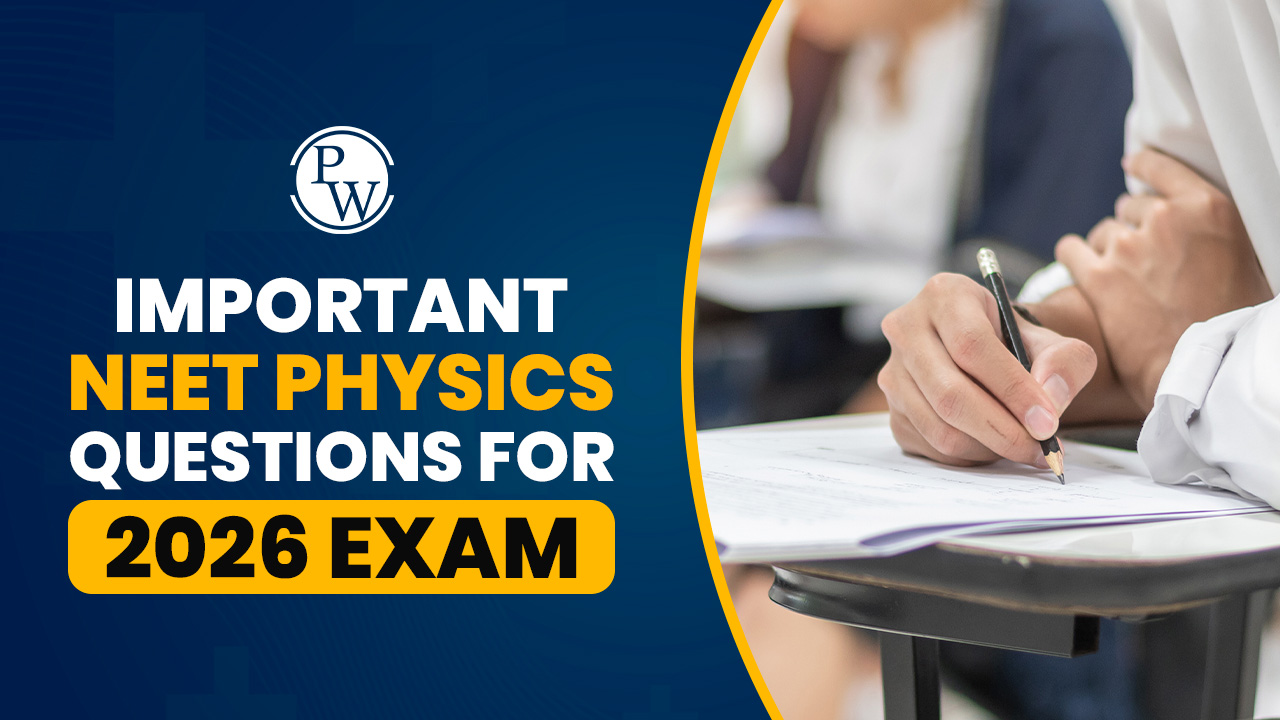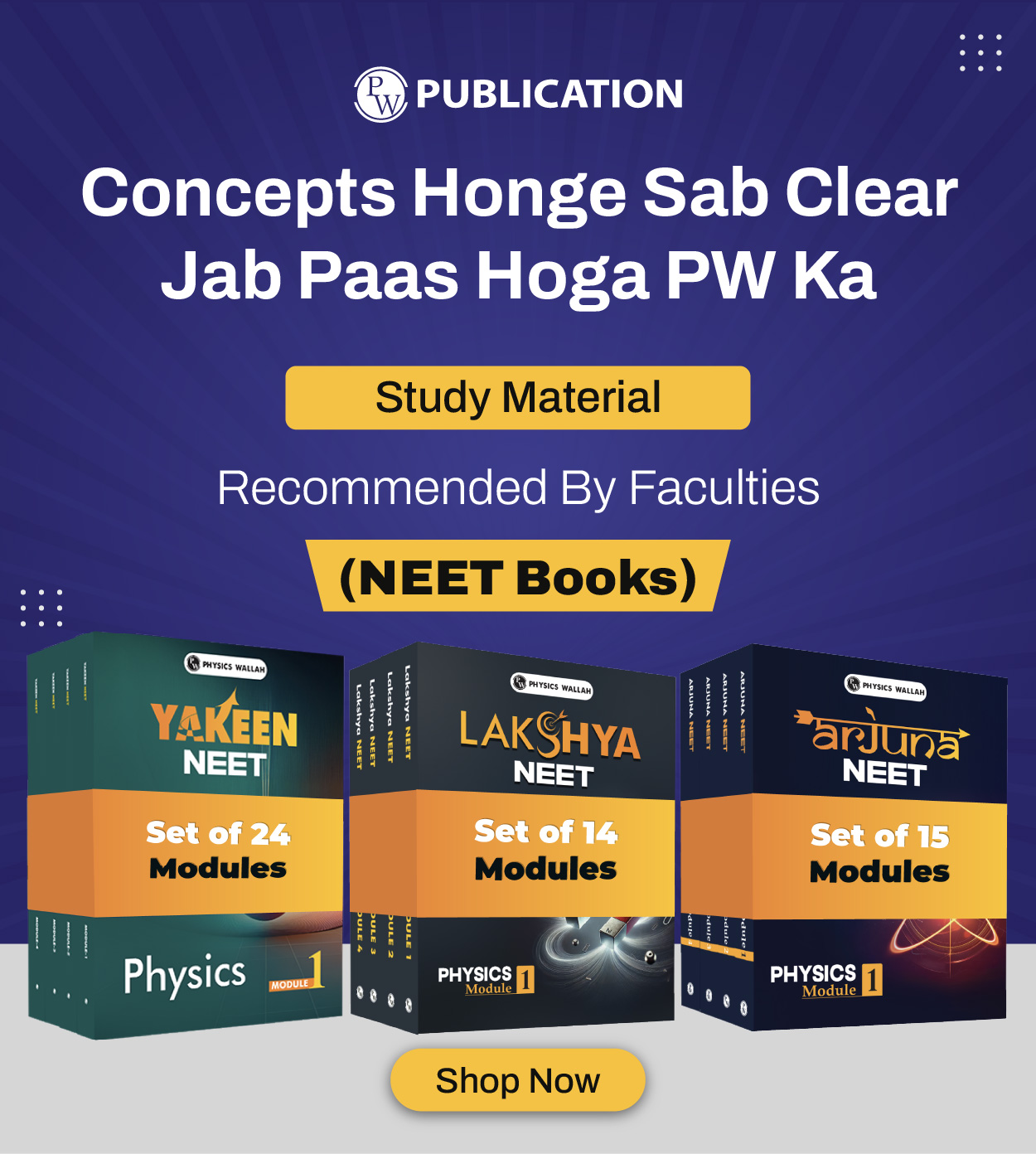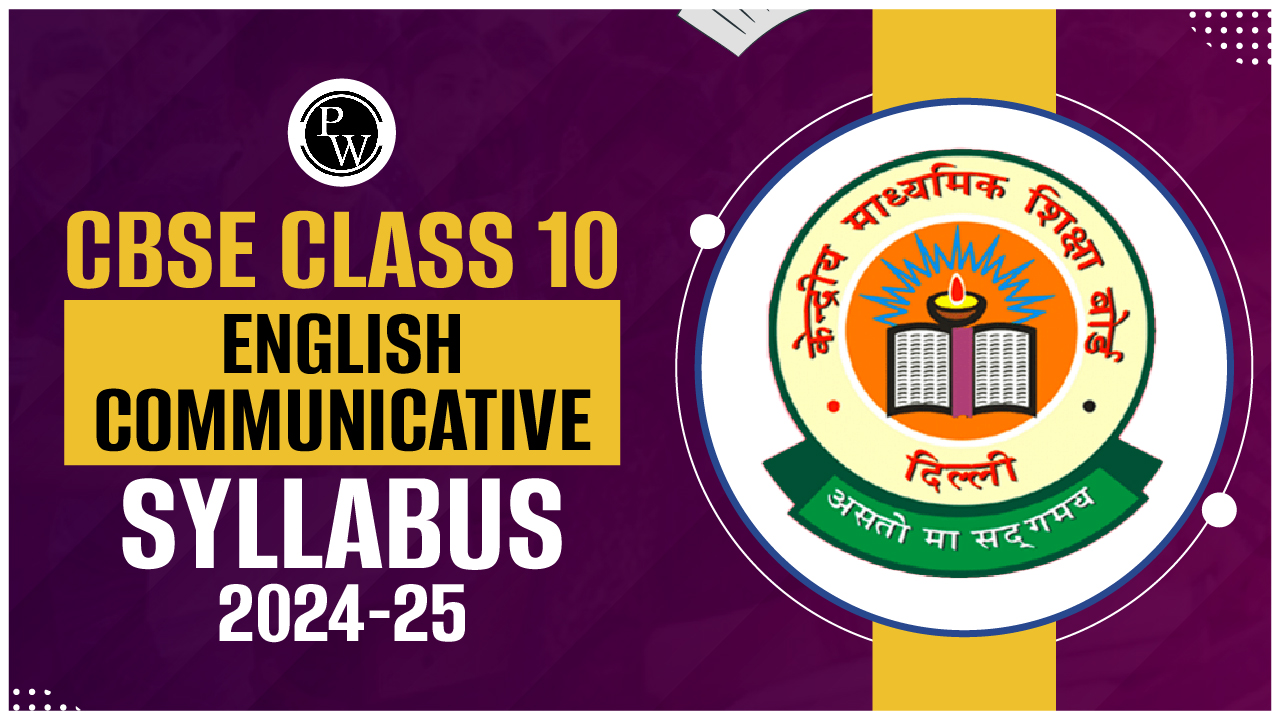Important NEET Physics Questions for 2026 Exam

Important NEET Physics Questions for 2026 Exam: The NEET (National Eligibility cum Entrance Test) 2026 is expected to be held on the first Sunday of May, most likely May 3, 2026, as per past trends. This national-level exam is conducted by the National Testing Agency (NTA) and is the key to securing admission in MBBS, BDS, and other medical courses across India. The exam will be held in offline mode and will be available in 13 different languages.
NEET tests students on three core subjects, Physics, Chemistry, and Biology, with Physics often being the most challenging for many aspirants. Unlike Biology, which is more memory-based, NEET Physics questions require a clear understanding of concepts and strong problem-solving skills. Many students struggle with time management and accuracy in this section because of its numerical nature.
To score well in NEET 2026, it’s important to regularly solve Physics NEET questions, especially from topics like Mechanics, Electrostatics, and Modern Physics. In this article, we will focus on helping you prepare better by providing a set of useful and relevant NEET Physics questions that will help you with your NEET 2026 Physics.
Check Out: PW NEET Books
NEET 2026 Physics
The Physics section in NEET 2026 is known for its tricky numericals and concept-based questions. To score well, students must focus on practising Physics questions for NEET, especially from key topics like Mechanics, Thermodynamics, and Modern Physics. Check the details below.
|
Section |
Number of Questions |
Total Marks |
Question Type |
Syllabus Coverage |
|
Physics Section A |
35 Questions |
140 Marks |
MCQs (Single correct) |
Class 11 & Class 12 NCERT |
|
Physics Section B |
15 Questions (Attempt 10) |
40 Marks |
MCQs (Choice-based) |
|
|
Total (Physics) |
45 Questions |
180 Marks |
Objective Type (MCQ |
NEET 2026 Important Topics
To score well in the Physics section of NEET 2026, it is important to focus on the most commonly asked and high-weightage topics. Going through NEET Physics PYQ (Previous Year Questions) can help you understand which areas are frequently tested and what type of questions are framed. Many of these topics require conceptual clarity as well as strong numerical problem-solving skills.
|
Main Topic |
Important Subtopics |
|
Mechanics |
Kinematics, Laws of Motion, Work, Energy & Power, Rotational Motion, Gravitation, Properties of Bulk Matter, Fluid Mechanics, Circular Motion |
|
Thermodynamics |
Laws of Thermodynamics, Heat Transfer, Thermal Expansion, Calorimetry, Newton’s Law of Cooling |
|
Electrodynamics |
Electrostatics, Current Electricity, Capacitance, Ohm’s Law, Kirchhoff’s Laws, Magnetic Effects of Current, Moving Charges, Electromagnetic Induction, Alternating Current |
|
Modern Physics |
Dual Nature of Matter, Photoelectric Effect, Atoms, Nuclei, Radioactivity, Semiconductors, Logic Gates |
|
Optics |
Reflection and Refraction, Mirrors and Lenses, Wave Optics, Interference, Diffraction, Polarisation |
|
Waves & Oscillations |
Simple Harmonic Motion (SHM), Damped and Forced Oscillations, Resonance, Sound Waves, Doppler Effect |
|
Units & Measurements |
Units and Dimensions, Measurement Errors, Significant Figures, Dimensional Analysis |
|
Electromagnetic Waves |
Properties of EM Waves, Spectrum, Uses of EM Waves in Daily Life |
|
Ray Optics |
Refraction, Total Internal Reflection, Lens Formula, Optical Instruments |
|
Wave Optics |
Huygens Principle, Young’s Double Slit Experiment, Interference and Diffraction |
Check Out: NEET Previous Year Papers
Important NEET Physics Questions for 2026 Exam
1. Which of the following groups of physical quantities can be considered a group of fundamental physical quantities?
(a) Force, mass, time
(b) Mass, force, acceleration
(c) Velocity, time, displacement
(d) Velocity, momentum, mass
(e) None of the above
2. Which does not have the same unit as the others?
(a) watt·sec
(b) kilowatt·hour
(c) eV
(d) Joule·sec
3. The unit of distance is:
(a) Femtometer
(b) Angstrom
(c) Parsec
(d) Light year
(e) All of these
4. Assertion (A): Astronomical unit, light year, and parsec measure distance.
Reason (R): Each has the dimension of distance.
(a) Both A and R are true, and R is the correct explanation of A.
(b) Both A and R are true, but R is not the correct explanation of A.
(c) A is true, but R is false.
(d) Both A and R are false.
5. Which of the following is a characteristic of a unit?
(a) It must be universally accepted.
(b) It must be invariable and well defined.
(c) It must be of suitable size and easily available.
(d) All of the above.
6. Ratio of two similar physical quantities has unit.
(a) True
(b) False
7. Light year is used to measure:
(a) Distance between stars
(b) Distance between atoms
(c) Revolution time of Earth around Sun
(d) None of these
8. The wrong unit conversion among the following is:
(a) 1 angstrom = 10⁻¹⁰ m
(b) 1 fermi = 10⁻¹⁵ m
(c) 1 light year = 9.46 × 10¹² m
(d) 1 astronomical unit = 1.496 × 10⁻¹¹ m
9. Which of the following is not a unit of time?
(a) Microsecond
(b) Leap year
(c) Lunar month
(d) Parallactic second
(e) Solar day
10. The unit of Stefan’s constant (σ) is:
(If rate of heat radiation is given by σAT⁴, where A is Area and T is Temperature)
(a) Wm⁻²K⁻¹
(b) Wm⁻²K⁻²
(c) Wm⁻²K⁴
(d) Wm⁻²K⁻⁴
For more Important NEET Physics Questions for 2026 Exam, refer to the below link.
|
NEET Physics Questions for 2026 Exam |
|
|
NEET 2026 Physics Chapterwise and Topicwise 6000+ Practice Questions with Answer |
|
|
NEET Physics Notes, , Formulas, Mnemonics, Tips & Tricks for NEET Exam |
|
|
38 Years NEET Physics Previous Year Solved Question Papers |
|
How to Prepare for NEET 2026 Physics?
1. Understand the NEET Physics Pattern
Before starting your Physics preparation, you should know how Physics is covered in the NEET exam. NEET Physics carries 180 marks and is divided into two parts, Section A and Section B. Section A has 35 questions, and you must attempt all of them. Section B has 15 questions, but you only need to answer any 10. All questions are objective type (MCQs). Check out the NEET 2026 Exam Pattern above.
2. Know Which Chapters Are More Important
Physics has many chapters from both Class 11 and 12, but not all have equal weightage. Some chapters appear in NEET almost every year, while others are asked less often. Chapters like Mechanics, Thermodynamics, Current Electricity, Modern Physics, and Optics are usually more important.
-
Instead of trying to study everything at once, begin with the topics that are more scoring and come more often in the exam.
-
Make a list of chapters that are asked frequently and start preparing them first.
-
You can find this easily by looking at previous year questions and seeing which chapters repeat the most.
3. Use Only the Right Study Material
Many students make the mistake of using too many NEET books. This leads to confusion. The most trusted material is your NCERT Physics textbook for both Class 11 and 12. Read it line by line, understand the diagrams, practice the examples given in the book, and revise regularly.
-
Once you finish the NCERT, you should start solving NEET Physics PYQs.
-
These are actual questions asked in previous years. They will help you understand what kind of questions NEET asks and how they are framed.
4. Solve Physics Questions for NEET Every Day
Physics is not a subject you can study just by reading. You must solve questions every single day. First, go through the theory from NCERT, and then try solving questions from that chapter. This will help you test your understanding.
-
Once you are done with the basics, start solving Physics NEET questions from previous years.
-
Try solving 20 to 30 questions a day, and see how many you get right. Don’t worry if you make mistakes, learn from them.
-
Make a notebook where you can note the important formulas and your mistakes. This will help in quick revision later.
5. Focus on NEET Physics PYQs for Better Understanding
One of the most helpful ways to prepare is by solving NEET Physics PYQs. These are real questions from past NEET exams. Solving them will show you the kind of questions that are repeated and the areas from which most questions are asked.
-
You can solve them chapter-wise or year-wise. Start with chapter-wise PYQs once you finish a topic.
-
After that, move to full-length mock tests using the previous year papers.
-
This will also help you learn how to manage your time during the actual exam.
Also Check, NEET Question Banks
6. Clear All Doubts Without Delay
While solving questions, you may get stuck or feel confused about some concepts. Don’t leave your doubts for later. If you don’t understand something, go back to your NCERT and read it again. Ask your teacher or a friend if you’re still not clear.
7. Revise Formulas and Concepts Again and Again
Physics has many formulas, and you must remember them clearly. Make a small notebook or chart of all important formulas and keep revising them regularly. If you don’t revise them often, you may forget them during the exam.
-
Spend some time every week just to revise what you have already studied. You can also write short notes on difficult topics to read later.
8. Take Practice Tests and Learn from Your Mistakes
After completing most of your syllabus, start taking full Physics mock tests. Time yourself and try to finish the Physics section within the given time. After each test, check your answers and try to understand why any mistakes happened.
-
Make a list of the topics where you lost marks and revise them again.
-
This step will make you more confident and help you reduce mistakes in the actual exam.
Read More: NEET Previous Year Question Papers with Solutions PDF
NEET Physics Questions FAQs
1. How many Physics questions are asked in NEET 2026?
In NEET 2026, there will be 45 Physics questions, 35 in Section A (compulsory) and 15 in Section B (out of which you must answer only 10).
2. What is the total mark for Physics in NEET?
Physics carries 180 marks out of the total 720 in NEET.
3. Is Physics tough in NEET?
Many students find Physics a bit tough because it includes both theory and numerical questions. But with regular practice and revision, you can do well.
4. Which book is best for NEET Physics preparation?
Start with NCERT Class 11 and 12 Physics textbooks. After that, solve NEET Physics PYQs (Previous Year Questions).
5. Are previous year Physics NEET questions useful?
Yes, solving Physics PYQ NEET helps you understand the types of questions that are asked again and again. It also helps in time management.











